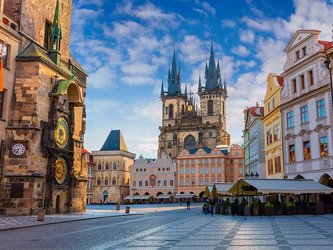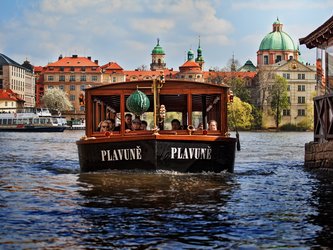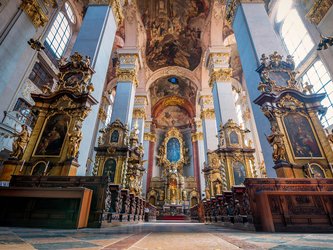
Czech bank holidays
January 1: New Year
For the New Year, Czechs send each other greeting cards with the letters "PF", which come from the French "Pour féliciter". This custom originates from the 19th century, when the secularisation of society began. PFs were then a secular alternative to Christmas greetings. In the 19th century, French was the language of high society, so it was used in those days and still is today.
For the Czechs, New Year’s Day marks their destiny for the whole year ahead. This means that you have to pay back the money you have borrowed to start the new year without any debt.
On this day, the lunch dish consists of lentils: according to Czech tradition, lentils bring money. Finally, Czechs should not eat poultry, so that their happiness does not vanish, nor rabbit, so that it does not escape.
In Prague, the official fireworks display takes place on the evening of 1 January from one of the capital’s hills.
Good Friday
Since 2016, Good Friday is now a public holiday in the Czech Republic.
Easter Monday
At Easter, the Czechs keep many traditions and customs, the origin of which they often do not know. One of these strange traditions is for men to go around the village with a braided stick in their hands, decorated with ribbons, to whip the girls around. It is said that in this way the girls will not dry up and will remain fertile and beautiful for the coming year. For this occasion, people in some parts of the Czech Republic dress in traditional costume.
To reward the men for keeping them fresh, the women give them hand-painted eggs in return, or sometimes pour cold water on their faces.
As for culinary traditions, it is the lamb-shaped cake that is prepared. It is sometimes decorated with meringue or with chocolate, to recall the wool of the animal.
May 1: Labour Day/Lovers’ Day
In the Czech Republic, May Day was one of the most important days during the communist era: large parades were organised, which all citizens had to attend.
In the Czech Republic, May Day is also the Day of Love. According to a pagan tradition, a girl should be kissed by her better half under a cherry blossom tree, so that she remains beautiful and attractive.
In Prague, the Petřín Hill is a favourite place for lovers to kiss. This is where they meet, near the statue of the Czech poet Karel Hynek Mácha, the representative of romanticism, one of whose poems is named after May. Here is a small excerpt from it:
"Late evening, on the first of May —
The twilit May — the time of love.
Meltingly called the turtle-dove,
Where rich and sweet pinewoods lay."
May 8: Liberation from Fascism Day
In Prague, the 8 May celebrations start at Vítkov National Memorial with a parade of the Czech army’s units of honour and the Prague Castle Guard. Then wreaths are laid at the foot of the Tomb of the Unknown Soldier, as a tribute to the victims of the war in which almost 380,000 Czechs lost their lives.
July 5: Day of the Slavic missionaries Cyril and Methodius
Cyril and Methodius were two Slavic missionaries from Thessaloniki who arrived in Great Moravia in 863, at the request of the Moravian ruler Rastislav, in order to explain the Christian faith to the local inhabitants in a language other than Latin, and which would be understandable to them. The inhabitants of Greater Moravia thus became the first in Europe to hear the liturgy in their own language. Behind this mission, Rastislav had a political goal: to save his country from the political and religious influence of the Frankish kingdom.
These brothers therefore invented a complex language, capable of responding both to the reality that people experienced in their daily lives and to liturgical needs. This language was based on the Slavic language used in the region of origin of these two brothers and differed only slightly from the Slavic language used in Greater Moravia.
Moreover, to express this new language in writing, Cyril invented a specific alphabet. This was the beginning of the Glagolitic script.
Cyril and Methodius were canonised at the end of the XIX century and became the patrons of Moravia.
July 6: Anniversary of the martyrdom of Jan Hus (1415)
Jan Hus is an important figure in Czech history. He was a Roman Catholic priest, reformer, preacher and probably one of the most important Czech medieval thinkers. He also simplified Czech spelling by replacing long strings of consonants with letters with accents.
He taught at Prague University and criticised the moral decay of the Church in his religious works. The Catholic Church condemned him as a heretic and burned him more than 700 years ago in Constance, the border town between Switzerland and Germany. Jan Hus always refused to renounce his beliefs.
September 28: Anniversary of the death of Saint Wenceslas (929)
St Wenceslas is one of the most popular Czech saints. He is the protector of the nation, patron saint, martyr and a figure in Czech history who played a leading role in the emancipation of the Czech state and the Přemyslid dynasty within Christian Europe.
It was St. Wenceslas who had the rotunda built at Prague Castle, which later became the actual gothic St. Vitus Cathedral.
On September 28, events are held throughout the Czech Republic in his honour.
October 28: National Day – the day when independent Czechoslovakia was founded (1918)
October 28 was one of the most important days for the Czech nation. After 400 long years, the Czechs were finally freed from the domination of the Habsburg dynasty.
Tomáš Garrigue Masaryk was the first president of the first Czechoslovak Republic and was an exemplary president for the people. During his term of office, the country enjoyed a period of prosperity.
Today, the city of Prague organises many events for this bank holidays. This day is also an opportunity to visit many places usually closed to the public, including the Chamber of Deputies and the Senate in Prague.
November 17: Day of the Struggle for Freedom and Democracy
This day commemorates a student demonstration, organised with the approval of the communist regime, to pay tribute to Jan Opletal, a Czech student who was fatally wounded during a demonstration against Nazism in 1939.
A few days after the fall of the Berlin Wall, this demonstration spontaneously turned into a demonstration against the communist regime, with tens of thousands of people joining in. This was the beginning of the Velvet Revolution. The brutal intervention of the police to put an end to the rally on 17 November triggered a wave of strikes and demonstrations nationwide. A few weeks later, the communist regime was abolished and Václav Havel was elected president of the republic on 29 December.
Since that day, many events and concerts have been organised to commemorate this historic day.
December 24: Christmas Eve
The Czechs call this day Štědrý den, the "generous day".
In the evening, the traditional meal of breaded carp and potato salad is served. Then a bell is rung to announce the arrival of the baby Jesus, Ježíšek, and gifts are given to children.
The Czechs also have the habit of fasting or eating little on this day. It is said that whoever manages not to eat until evening will see the "zlaté prasátko" (golden pig).
December 25 and 26
Czechs usually visit their families.




